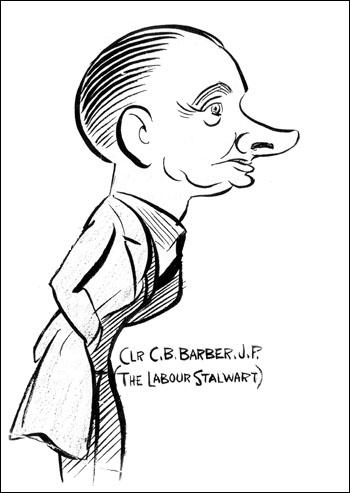Charles Barber
Charles Bertram Barber was born in 1884. At the age of fourteen he joined the Worthing Post Office. The day after the outbreak of the First World War Barber enlisted in the British Army. He served in the Signalling Corps on the Western Front until April 1919. (1)
Barber was also a leading figure in the Labour Party. Local elections in Worthing were very much under the control of the Conservative Party and seats were not contested. However, in 1919 the the Labour Party contested all seven wards in the elections to Worthing Borough Council for that year. None of the candidates were elected but in Broadwater ward the margin of defeat was only 92 votes. In 1922 Charles Barber won Broadwater with a majority of 47 over the Conservative candidate, H. R. Carter. (2)
Barber was re-elected in his ward in 1925 where he was joined by Thomas Cramp (Victoria). Barber was elected for Offington ward in 1928. Joseph Mason was elected to the council for Clifton (1930-1945). He always stood as an independent, although he was a member of the Labour Party. According to Chris Hare, the author of Worthing: A History (2008), Barber and other Labour councillors "impressed even die-hard Tories by their eloquence and their moderation. In 1931 he was unopposed in the election. (3)
At an election meeting in Broadwater on 16th October 1933, Charles Bentinck Budd revealed he had recently met Sir Oswald Mosley and had been convinced by his political arguments and was now a member of the British Union of Fascists (BUF). Budd added that if he was elected to the local council "you will probably see me walking about in a black shirt". (4)
Budd won the contest and the national press reported that Worthing was the first town in the country to elect a Fascist councillor. Worthing was now described as the "Munich of the South". Mosley now announced that Budd was the BUF Administration Officer for Sussex . On Friday 1st December 1933, the BUF held its first public meeting in Worthing in the Old Town Hall. According to one source: "It was crowded to capacity, with the several rows of seats normally reserved for municipal dignitaries and magistrates now occupied by forbidding, youthful men arrived in black Fascist uniforms, in company with several equally young women dressed in black blouses and grey skirts." (5)
Charles Barber and his wife, Marion Barber, along with John Robert Peryer, a maths teacher at the Worthing High School for Boys (WHSB) organised a Worthing Anti-Fascist Committee. The also established the International Friendship League, an organisation attempting to "foster peace and harmony between groups of young people from a spectrum of European nations." (16)

In 1933 Charles Barber was made an Alderman. He was also Chairman of the Parks and Allotments Committee and an active member of the Public Health Committee and Education Committee. In 1936 he became mayor of Worthing. He was the first member of the Labour Party to achieve this honour. (4)
Charles Barber resigned from the council in November 1937 because of developments in the way that the council was being run by a caucus of the Ratepayers League. He retired from the Post Office after 46 years service in 1944. Labour reached its high water mark in Worthing in 1945 when, out of a Council of 40 members it elected three councillors in the elections of November of that year. Barber in Park ward, F.G.Freeman and M.W.Gordon in Broadwater. A month later a fourth Labour councillor (Mrs Beatrice Jones) was elected in a by-election for Durrington Ward.
Charles Barber was appointed chairman of Worthing magistrates in 1954 and became a Freeman of the Borough in 1959.
Primary Sources
(1) Chris Hare, Worthing: A History (2008)
The Labour Party in Worthing enjoyed the benefit of some very able yet self-effacing leaders. Men such as C. B. Barber and S. E. Nixon impressed even die-hard Tories by their eloquence and their moderation. Barber's election to the Council in 1922 was a significant achievement, and over the next decade other Labour candidates were also returned. Barber himself remained on the Council for many years, and was elected mayor in 1936.
